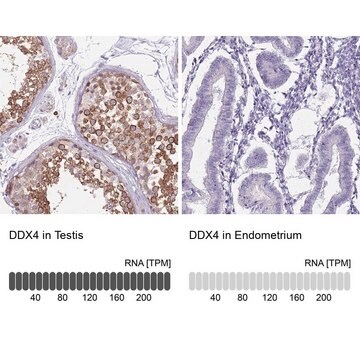AB4330
Anti-DDX4 (Vasa) Antibody
from rabbit, purified by affinity chromatography
Synonym(s):
DEAD (Asp-Glu-Ala-Asp) box polypeptide 4, probable ATP-dependent RNA helicase DDX4, DEAD/H (Asp-Glu-Ala-Asp/His) box polypeptide 4, Vasa homolog, DEAD box protein 4
About This Item
Recommended Products
biological source
rabbit
Quality Level
antibody form
affinity isolated antibody
antibody product type
primary antibodies
clone
polyclonal
purified by
affinity chromatography
species reactivity
rat, human, mouse
technique(s)
immunohistochemistry: suitable (paraffin)
western blot: suitable
NCBI accession no.
UniProt accession no.
shipped in
wet ice
target post-translational modification
unmodified
Gene Information
human ... DDX4(54514)
General description
Specificity
Immunogen
Application
Stem Cell Research
Pluripotent & Early Differentiation
RNA Metabolism & Binding Proteins
Quality
Western Blot Analysis: A 1:500 dilution of this antibody detected DDX4 (Vasa) in 10 µg of mouse testis tissue lysate. Western Blot performed without Tween.
Target description
Physical form
Storage and Stability
Analysis Note
Mouse testis tissue lysate
Disclaimer
Not finding the right product?
Try our Product Selector Tool.
Storage Class Code
12 - Non Combustible Liquids
WGK
WGK 1
Flash Point(F)
Not applicable
Flash Point(C)
Not applicable
Certificates of Analysis (COA)
Search for Certificates of Analysis (COA) by entering the products Lot/Batch Number. Lot and Batch Numbers can be found on a product’s label following the words ‘Lot’ or ‘Batch’.
Already Own This Product?
Find documentation for the products that you have recently purchased in the Document Library.
Our team of scientists has experience in all areas of research including Life Science, Material Science, Chemical Synthesis, Chromatography, Analytical and many others.
Contact Technical Service







